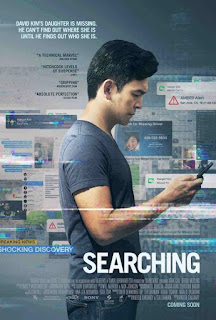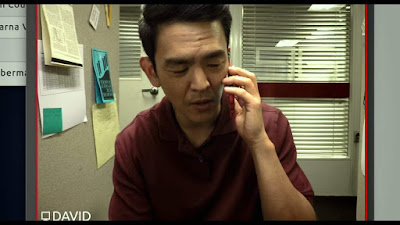or
Oh, What a Tangled World Wide Web We Weave
Searching, the excellent, very clever thriller by Aneesh Chaganty begins with a 15 minute sequence so gut-wrenching to the heart that it reminded me of the beginning of Up, which was a masterpiece of tugging the emotions. The two sequences have a comparable story-telling strategy—laying the foundation for the story to come, setting up the ground-work to show the prologue that will serve as motivation for what will come, and act as a salve when things get rough.
The story for Searching is simple—the strategy telling it is not. There have been so many "missing children" movies, it could have it's own genre...from The Searchers to Close Encounters to Taken, the story of the search for a child is compelling no matter what the setting of the film is.
But, Searching is unique. It could be thought a "found footage" movie, but it isn't. It takes the strategy of Paranormal Activity and does it a few steps better for the computer age and it's announced with it's very first image (which takes a momentary pause of orientation to realize that all the studio credits have ended), so common—but only for the last 30 years—and so much a part of our world that one might feel cheated by the idea that it's cheap film-making. It's a shot of a computer-screen with a family wall-paper on it. And for the next 106 minutes, you will rarely leave that page. So pervasive is computer technology now that you don't need to tell a compelling story without moving away from the screen. As movie-goers, we're watching a screen, anyway, but there's an eerie kaleidoscopic effect when you're watching screens within screens—like being in a hall of mirrors. It focuses your attention—as opposed the split-screen experiments started in the 1960's, which divided it—and you find yourself lasering in on the information, and you don't have to go far to find it—the landscape is very limited.
Plus, you're in the position of the person in front of the screen.
We meet the Kim's—through home video at first—David (John Cho), Pamela (Sara Sohn) and daughter Margot (played at various ages by Alex Jayne Go, Megan Liu, Kya Dawn Lau, and mostly by Michelle La)—video's first, then e-mails, PM's, calendar's, Google searches—especially the one for "lymphoma" and "fighting lymphoma as a family"—as we see the arc of a young family, loving, bonding, and eventually in crisis.
It's a brilliant way to tell a story, through archived material, compressing time and efficiently jumping from highlight to highlight, until the story is complete. Director Chaganty doesn't even have to do a transition into present day. "Real time" is presented with Personal Messages, a "Facetime" call. Dad David calls daughter Margot to tell her she forgot to take out the trash. It's a big deal to him, requiring escalation from text to video and Margot picks up to tell him she can't do it right now, that she's in a study group. Okay, says David. when will you be home? I'll probably be going all night, she says. Dad's not pleased but urges her to talk to him when she's done.
David talks to his brother Peter (Joseph Lee), who's trying to prepare a meal that David's wife Pam had "down." David can't help but notice the container of weed on the kitchen counter, which Peter says is actually oregano and they squabble, like returning to a subject both have gone over again and again, which neither one wishes to re-visit. Glumly, Peter goes into Pam's partition of the computer and send him the recipe. He isn't feeling well, and the next we see of him he's asleep, a bottle of pills in the foreground in front of the computer's cam.
Margot texts. It goes unnoticed. She calls once, twice. Unanswered.
The next day David is at work, tele-conferencing, and he hasn't heard from Margot. He's pissed. She's grounded. But, as the day wears on, he starts to investigate. Margot takes piano lessons on Fridays. He doesn't know the teacher. He searches, finds her number, calls. The teacher's a bit annoyed that he called during a lesson, but he asks to talk to Margot. Then, there's a bombshell: Margot hasn't been coming to her lessons for six months and had, in fact, canceled them. Well, he gave her money for the lessons—what happened to that? Margot conveniently left her laptop behind and David starts to use that and Pam's files to start calling friends and acquaintances—the study group is unhelpful (kids!), but talking to the mother of one of Margot's childhood friends gives him some hope—a bunch of them were going to the mountains, Margot was invited, and they're out of cell-range. Of course! David calms down, and waits for Margot to call.
She doesn't call. The friend does. Sure, he invited Margot, but she didn't go with them and he hasn't heard from her. David panics and calls the police, filing a missing person report. Eventually he's contacted by Det. Rosemary Vick (Debra Messing) with the San Jose police department. He checks up on her, is impressed and starts doing his own investigative work, contacting Margot's friends, determining where they were on that Thursday night and coming up with an alibi database for use by the police. But, he's obsessive about it and that worries Vick. His work leads him down blind alleys and he starts accusing people who are taking a more cavalier attitude to Margot's disappearance. He's losing sleep and becoming more agitated...and more of a loose cannon.
But, as David does some more obsessive spelunking, he finds some disturbing things—thast Margot is a little isolated at her high school, that her photos cached on Facebook are a little glum, that she's started a blog and a chat channel and some of the participants there are a little sketchy, He sees that she's been depositing the money intended for the music lessons in an account of her own, and that she had recently withdrawn it. Then, Vick calls and says that they've found some security footage of Margot's car leaving a gas station on that Thursday night and leaving town. She also produces a fake driver's license under another name. Vick is convinced that Margot is a runaway. And David comes to realize that he may not know his daughter at all.
Let's stop there. Going any further will produce spoilers, even for the blind alleys and wrong turns in the investigation. But, that is the gist of the details.
Searching does a great job of subtly showing the positives and negatives of the social age and archiving your life on it. It's a source for sharing and expression, but it is also porous and public. Despite all the security protocols in the background, it's all out there and can be disseminated to anyone, good, bad, and maliciously indifferent. One has to be careful, for at the same time you're being open with your life, you're also opening it up to scrutiny and manipulation, where intentions can be decidedly mixed—just read the comments of...anything.Searching throws that into stark relief, both as distraction and as plot-point.
One could nit-pick. Searching doesn't always live up to its rigorous intended mise-en-scene—there are some liberties taken in the third act with the point-of-view, and you get the impression it's not happening solely on David's or Margot's computer. It's not a cheat, really, it's just a little disappointing that the focus gets a little fuzzed up. There's not a real need to open it up, but the story demands to get resolved in some way and David can't be a passive watcher to that. He has to participate, and so perspective changes. Understandable, even if it also does make the denouement feel a bit tidy and rushed...and more importantly, less amateurishly captured.
What one cannot argue with is the performance of John Cho—he is nearly on the screen every single moment and we see him go from a young family man to one shouldering pain to an absolute frazzled mess. The actor must have lost a lot of sleep during the making of this movie because you can see him physically age throughout the movie without benefit of make-up and merely by simulating the trauma that the character goes through, the lines in his face deepen, he becomes more haggard and you become worried that he is going to fall apart. It is stunning work, and if I had my choice right now, I'd put him on the short list for the Best Performance by an Actor Oscar.












No comments:
Post a Comment